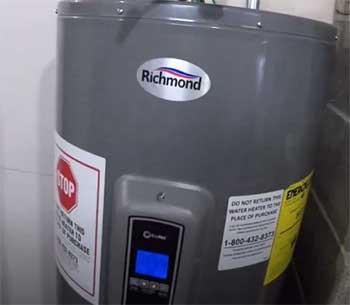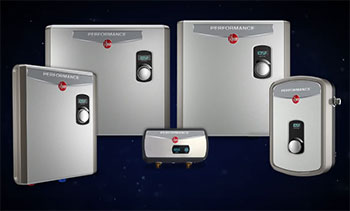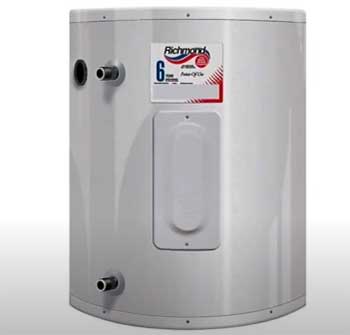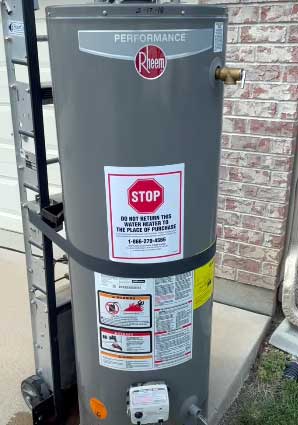When I set out to replace my old water heater, I found myself weighing options between Richmond and Rheem, two brands that kept popping up in my research. Both promise reliable hot water, but which one truly delivers for my home’s needs?
In this article, I’ll share my journey of comparing Richmond and Rheem water heaters, breaking down their features, pros, cons, and performance. My goal is to help you make an informed decision by exploring their differences and similarities, ensuring you pick the right water heater for your household.
A Brief Comparison Table
| Feature | Richmond | Rheem |
| Price Range | Budget-friendly ($600-$1,500) | Mid to high-end ($700-$2,000) |
| Warranty | 6-12 years, lifetime on Marathon | 6-15 years, longer on premium models |
| Energy Efficiency | Good (UEF 0.62-3.55) | Excellent (UEF 0.62-4.0) |
| Model Variety | Tank, tankless, hybrid, solar | Tank, tankless, hybrid, solar, more options |
| Smart Technology | Limited, some models with LeakSense | Advanced, EcoNet app, WiFi connectivity |
| Noise Level (Hybrid) | Moderate (50-55 dB) | Quiet (49 dB on Performance Platinum) |
| Durability | Reliable, simpler designs | High durability, advanced materials |
| Best For | Budget-conscious households | Tech-savvy, energy-efficiency seekers |
My Journey With Water Heaters
A few months ago, my old water heater started acting up—lukewarm showers and strange noises were my wake-up call. Living in a small house with a family of four, I needed a reliable, cost-effective solution that wouldn’t break the bank.
I’d heard good things about both Richmond and Rheem, but I wasn’t sure which would suit my needs. Since Richmond is manufactured by Rheem, I initially thought they might be interchangeable, but I quickly learned they cater to different priorities.
Let me walk you through what I discovered about these two brands.
Understanding Richmond Water Heaters

Richmond, established in 1983, is a brand under Rheem’s umbrella, designed to offer value-driven water heaters.
I was drawn to Richmond because of its reputation for affordability without skimping on quality.
Their lineup includes gas, electric, tankless, hybrid, and solar models, covering a wide range of household needs.
For instance, their Essential 50-Gallon Natural Gas Water Heater, priced around $647, caught my eye for its low cost and solid performance for a family like mine.
Key Features of Richmond Water Heaters
One thing I appreciated about Richmond is their focus on practical features. Their EverKleen self-cleaning system, for example, reduces sediment buildup, which can extend the tank’s life. I also noticed their Lifeguard stainless steel heating elements in electric models, designed to prevent dry-fire burnout—a common issue with cheaper heaters.
Their hybrid models, like the Encore 10E40-HP530, boast a Uniform Energy Factor (UEF) of up to 3.55, meaning they’re highly efficient, saving up to $480 annually on energy bills. For homes with solar setups, the Solpak system, complete with a storage tank and multi-speed pump, is a great eco-friendly option.
Pros of Richmond Water Heaters
- Affordability: Richmond’s prices, ranging from $600 to $1,500, are a lifesaver for budget-conscious buyers like me. For example, their 50-gallon gas model at $647 delivers solid performance without draining my wallet, making it accessible for families upgrading on a tight budget.
- Reliable Performance: The EverKleen self-cleaning system and high-density foam insulation ensure consistent hot water and reduce corrosion, which I found reassuring after dealing with my old heater’s sediment issues.
- Variety of Models: Richmond’s range—tank, tankless, hybrid, and solar—means there’s something for everyone, whether you’re in a small apartment or a sprawling house with heavy hot water demands.
- Warranty Options: Their 6- to 12-year warranties, with lifetime coverage on Marathon models, gave me confidence in their longevity, especially for a family planning to stay put for years.
- Made by Rheem: Knowing Rheem’s manufacturing expertise backs Richmond was a big plus, as it ensures quality control and access to reliable parts, even for budget models.
- Ease of Maintenance: The self-cleaning systems and pre-installed valves make maintenance straightforward, which is great for someone like me who prefers low-hassle upkeep.
Cons of Richmond Water Heaters
- Limited Smart Features: Richmond lags in smart technology. Only select models offer LeakSense, and there’s no app-based control like Rheem’s EcoNet, which disappointed me as I wanted remote monitoring for convenience.
- Customer Service Challenges: Reviews on sites like PissedConsumer (1.8/5 rating) highlighted slow response times and issues with parts replacements. One user described a tank leaking just four months after installation, which made me wary of potential headaches.
- Lower Durability in Entry-Level Models: While reliable overall, some budget models have shorter lifespans. I read about units failing within 6-12 months, particularly in hard-water areas where corrosion is a concern.
- Noise Concerns: Hybrid models, like the Encore, operate at 50-55 dB, similar to a loud conversation. In my small basement, this could be disruptive, especially at night when sound carries.
- Limited High-End Options: Richmond focuses on value, so their premium features, like advanced heat pump technology, aren’t as robust as Rheem’s, which might matter if you’re looking for top-tier efficiency.
Exploring Rheem Water Heaters
Rheem, founded in 1925, is a titan in the water heater industry, known for its innovative designs and energy-efficient technologies. Their products range from traditional tank models to advanced hybrids like the Performance Platinum, which retails for about $799 for a 50-gallon unit.
Rheem’s focus on cutting-edge features, like WiFi connectivity, made me curious about whether the extra cost was worth it for my home.
Key Features of Rheem Water Heaters

Rheem’s Performance Platinum stood out to me with its quiet operation (49 dB), perfect for my small house where noise is a concern.
Their EcoNet app allows remote control and energy tracking, which I found appealing as a tech-savvy homeowner.
The ProTerra series, with a UEF of up to 4.0, is among the most efficient on the market, saving up to 75% on energy costs. Rheem’s tankless models, like the Mid-Efficiency 8.4GPM Outdoor Natural Gas Tankless Water Heater, conserve over 1,100 gallons of water annually, which is a big plus for eco-conscious buyers.
Pros of Rheem Water Heaters
- Advanced Technology: Rheem’s EcoNet app lets me control temperature and monitor usage from my phone, which is a game-changer for managing energy costs and catching leaks early.
- High Energy Efficiency: With UEFs up to 4.0, Rheem’s hybrids and tankless models save up to 75% on energy bills, potentially $500 annually, which is ideal for my goal of cutting utility costs.
- Quiet Operation: The Performance Platinum’s 49 dB hum is quieter than my fridge, making it perfect for my home where the water heater is near living spaces.
- Longer Warranties: Premium models offer 12- to 15-year warranties, outlasting many competitors and giving me confidence in long-term reliability.
- Durable Build: Magnesium anode rods and corrosion-resistant stainless steel components enhance longevity, which I appreciated after reading about other brands’ rust issues.
- Wide Range of Options: Rheem’s extensive lineup, from point-of-use to solar-powered units, caters to diverse needs, whether you’re in a condo or a large home.
Cons of Rheem Water Heaters
- Higher Cost: Rheem’s units, starting at $700 and reaching $2,000 for hybrids, pushed my budget. The Performance Platinum at $799 felt steep compared to Richmond’s $647 equivalent.
- Warranty Disputes: Some ConsumerAffairs reviews mentioned issues with warranty claims, like a 3-year-old unit denied coverage due to prior repairs, which made me question the fine print.
- Complex Installation: Advanced models like the ProTerra require professional installation, adding $200-$500 to costs, which isn’t ideal for my DIY inclinations.
- Mixed Reliability: Despite strong durability, some users reported leaks or controller failures within 2-3 years, particularly in high-end models with complex electronics.
- Learning Required for Tech: The EcoNet app, while powerful, has a slight setup curve, and I found reviews noting occasional connectivity issues, which could frustrate less tech-savvy users.
Also Read: Is Fast Water Heater Any Good?
Key Differences Between Richmond And Rheem Water Heaters
- Performance and Efficiency

When I compared performance, Rheem’s edge in energy efficiency became clear.
Their hybrid models, like the ProTerra, achieve a UEF of 4.0, compared to Richmond’s 3.55 for the Encore.
This translates to about $315-$480 in annual savings for Rheem versus $300-$480 for Richmond.
However, for my family’s moderate hot water needs (two showers, dishwasher, and laundry), Richmond’s efficiency was still impressive, especially at a lower price point.
For tankless models, Rheem’s ability to conserve 1,100 gallons of water per year stood out, but Richmond’s tankless units, with self-modulating power control, weren’t far behind in performance.
Both brands offer Energy Star-certified models, making them eligible for rebates and tax credits, which I factored into my decision since I wanted to install before the year-end tax deadline.
- Durability and Reliability
Durability was a big concern for me, given the horror stories of leaking tanks. Richmond’s glass-lined tanks and EverKleen system gave me confidence in their longevity, but reviews on PissedConsumer (1.8/5 rating) raised red flags, with complaints about tanks failing within months.
Rheem, while generally more reliable, wasn’t immune to issues either—ConsumerAffairs reviews mentioned leaks and controller failures in units as young as two years old. However, Rheem’s longer warranties (up to 15 years) and premium materials, like magnesium anode rods, tipped the scales slightly in their favor.
- Installation and Maintenance
As someone who’s not a DIY expert, I valued ease of installation. Richmond’s units come with pre-installed temperature and pressure relief valves, which simplifies setup. Their designs are straightforward, making them a favorite among contractors I spoke with.
Rheem’s advanced models, like the Performance Platinum, require professional installation due to their complex tech, which added $200-$500 to my costs. Maintenance-wise, Richmond’s self-cleaning systems reduce sediment issues, but Rheem’s EcoNet app alerts you to potential problems, which I found proactive.
- Noise Levels and Home Fit
Living in a small house, noise was a dealbreaker. Rheem’s Performance Platinum, at 49 dB, is quieter than a refrigerator, which was a huge relief. Richmond’s hybrids, at 50-55 dB, are comparable to a dehumidifier—not terrible, but noticeable in my unfinished basement.
If your water heater is near living spaces, Rheem’s quieter operation might be worth the extra cost.
- Cost and Value Analysis
Budget was a major factor for me. Richmond’s Essential 50-Gallon Gas Water Heater, at $647, was a steal compared to Rheem’s Performance Platinum at $799. Factoring in a 30% federal tax credit, a $150 utility rebate, and potential credit card cashback, I calculated an out-of-pocket cost of about $511 for the Richmond versus $650 for the Rheem.
However, Rheem’s long-term energy savings and longer warranties made me question whether the upfront savings with Richmond were worth it.
My Decision-Making Process

To choose, I listed my priorities: affordability, reliability, and low noise.
Richmond’s lower cost and solid performance made it tempting, especially since it’s backed by Rheem’s manufacturing.
But Rheem’s advanced features, like the EcoNet app and quieter hybrids, aligned better with my desire for a future-proof investment.
I also considered my household size—four people with moderate hot water use—and the fact that I plan to stay in my home for at least a decade.
Ultimately, I leaned toward Rheem for its efficiency and tech, but Richmond was a close second for its value.
Tips For Choosing Between Richmond And Rheem
Here’s what I learned to help you decide:
- Assess Your Budget: If upfront cost is key, Richmond’s $600-$1,500 range is hard to beat. If you can spend more, Rheem’s $700-$2,000 models offer long-term savings.
- Check Hot Water Needs: For small households (1-3 people), Richmond’s 40-gallon models suffice. Larger families (4-5) might prefer Rheem’s 50-80 gallon options.
- Consider Installation Space: Tankless or point-of-use models from both brands work for tight spaces, but Rheem’s hybrids need more room for ventilation.
- Factor in Rebates: Both brands qualify for Energy Star rebates and tax credits, so check local incentives.
- Consult a Pro: I talked to a plumber friend who recommended Rheem for durability but said Richmond’s simpler designs are easier to service.
Also Read: Is Home Depot For Your Water Heater Installation Any Good?
Frequently Asked Questions (FAQ)
No, they’re not identical. Richmond is a brand manufactured by Rheem, focusing on affordability and value, while Rheem offers more advanced, tech-heavy models.
Reliability varies, but Rheem, A.O. Smith, and Bradford White are often cited as top brands. Rheem’s longer warranties and durable materials make it a strong contender.
Yes, Richmond is a subsidiary of Rheem Manufacturing Company, established in 1983 to provide cost-effective water heaters.
Rheem is among the best for energy efficiency and smart features, but the “best” depends on your needs. Richmond offers better value for budget shoppers.
Conclusion: Making The Right Choice For You
Choosing between Richmond and Rheem water heaters comes down to your priorities. If you’re like me, weighing cost against long-term value, Richmond’s affordability and reliable performance make it a solid pick for smaller budgets.
But if you want cutting-edge tech and maximum energy savings, Rheem’s advanced features are worth the splurge. Consider your household’s hot water needs, space constraints, and whether smart features matter to you.
By weighing these factors, you’ll find the perfect water heater to keep your showers hot and your bills manageable.
